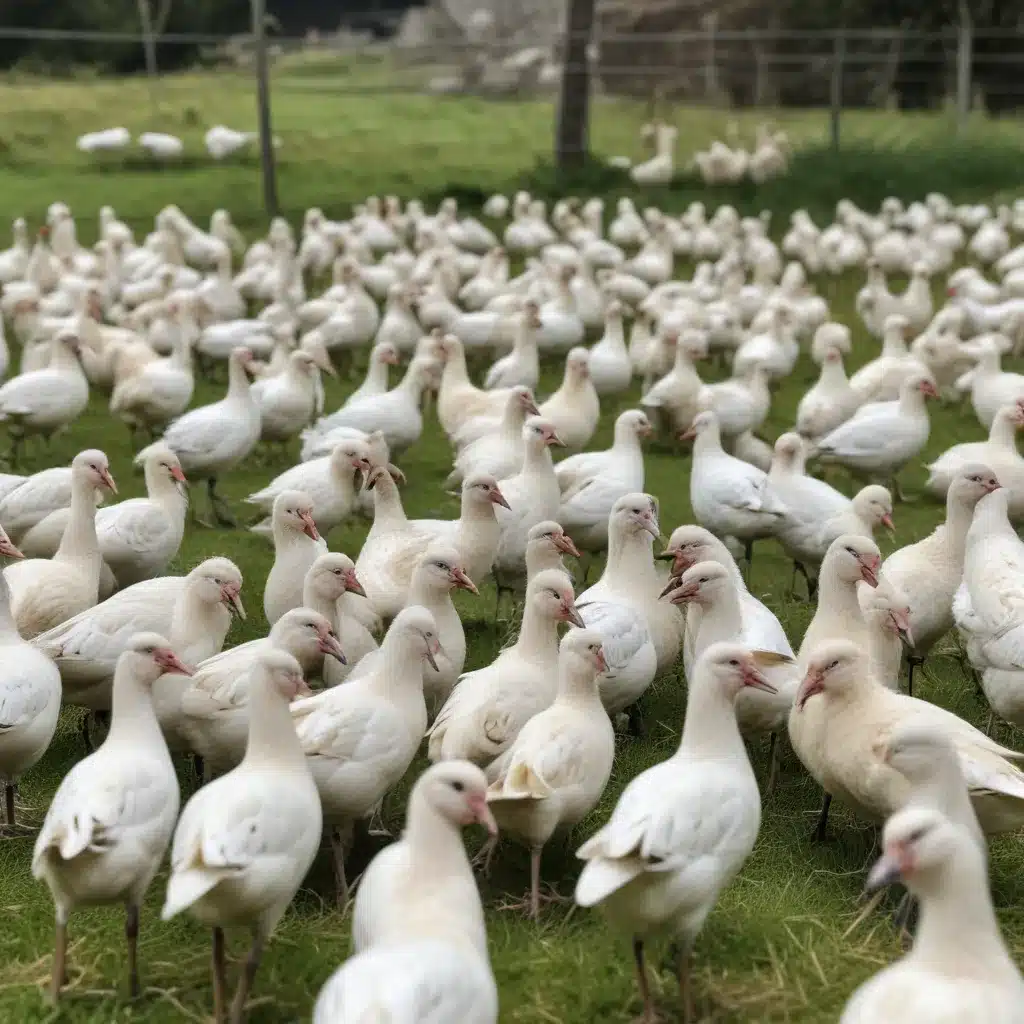
Avian Wellness and the Importance of Flock Dynamics: Fostering Social Wellbeing
Avian Social Behavior and Wellbeing
As an experienced avian caretaker, I’ve come to deeply appreciate the intricate social dynamics within bird flocks and their profound impact on overall avian wellness. At the heart of a healthy, thriving aviary lies a harmonious flock, where the birds seamlessly interact, communicate, and support one another’s needs.
Flock Hierarchy and Social Interactions
Birds are highly social creatures, and the establishment of a clear dominance hierarchy is essential for maintaining order and stability within the flock. Each individual bird has a unique personality and role to play, with dominant birds taking on leadership responsibilities and subordinates deferring respectfully. This hierarchical structure allows the flock to function cohesively, with members cooperating to ensure the group’s collective wellbeing.
Avian Communication and Socialization
Communication is the glue that binds a flock together. Birds utilize a rich repertoire of vocalizations, body language, and even physical touch to convey a wide range of messages, from warning calls alerting the group to potential threats, to gentle coos expressing contentment. Engaging in these social interactions not only strengthens the birds’ bonds but also helps them navigate the complexities of flock life.
Behavioral Patterns in Flocks
Observing the behavioral patterns of a bird flock reveals fascinating insights into their social dynamics. From synchronized foraging and roosting rituals to intricate courtship displays, these collective behaviors demonstrate the birds’ deep understanding of their social environment and their ability to coordinate as a unified group. Such behavioral synchronicity is a hallmark of a healthy, well-adjusted flock.
Importance of Flock Dynamics
Fostering Positive Social Environments
Recognizing the vital role of flock dynamics in avian wellbeing, we must strive to create and maintain positive social environments for our feathered companions. This involves carefully curating the composition of the flock, ensuring compatibility and harmony among the individuals. It also means providing ample opportunities for the birds to engage in natural social behaviors, such as preening, dust bathing, and play.
Challenges to Avian Social Health
However, disruptions to the delicate balance of flock dynamics can have detrimental effects on avian wellbeing. Factors such as sudden changes in group composition, limited space, or inadequate environmental enrichment can lead to increased aggression, feather plucking, and other stress-related behaviors. As avian caretakers, we must be attuned to these potential challenges and proactively address them to safeguard the birds’ social health.
Preserving Flock Cohesion
Ultimately, the preservation of flock cohesion is essential for the overall wellness of our avian charges. By fostering an environment that encourages natural social behaviors, we can help our birds thrive, both as individuals and as a unified community. This, in turn, promotes their physical health, reduces the risk of behavioral issues, and ensures a harmonious and enriching aviary experience for both the birds and their human caretakers.
Avian Enrichment and Stimulation
Physical and Cognitive Stimulation
Providing comprehensive physical and cognitive stimulation is a crucial aspect of promoting avian wellness and supporting positive flock dynamics. Engaging our feathered friends in a variety of activities, from foraging for hidden treats to solving simple puzzles, not only satisfies their innate curiosity but also strengthens their social bonds as they navigate these challenges together.
Habitat Design and Resources
The design of the birds’ habitat plays a pivotal role in facilitating natural social behaviors and fostering a sense of security within the flock. Incorporating diverse perching options, ample nesting areas, and enrichment features like mirrors and swings encourages the birds to explore, interact, and establish their own social hierarchies and routines.
Promoting Natural Behaviors
By catering to the birds’ inherent behavioral needs, we can empower them to engage in their full repertoire of natural activities, from courtship rituals to communal roosting. This not only supports their physical and mental wellbeing but also reinforces the cohesion and harmony of the flock, as the birds work together to fulfill their instinctual drives.
Veterinary Considerations in Avian Wellness
Preventive Care and Health Monitoring
Maintaining the overall health and wellness of our avian charges is paramount, and this begins with proactive preventive care and diligent health monitoring. Regular veterinary check-ups, vaccinations, and vigilant observation of the birds’ behavior and physical condition allow us to identify and address any potential issues before they escalate, safeguarding the wellbeing of the entire flock.
Addressing Behavioral Issues
Should behavioral challenges arise, such as aggression or feather plucking, it is essential to work closely with avian veterinary specialists to understand the underlying causes and develop targeted interventions. By addressing the root of these issues, we can not only resolve the immediate problem but also strengthen the overall social dynamics within the flock.
Nutrition and Dietary Requirements
Ensuring that our birds receive a balanced, species-appropriate diet is a fundamental aspect of avian wellness. Consulting with veterinary nutritionists and closely monitoring the birds’ intake can help us meet their unique dietary needs, which in turn supports their physical health, energy levels, and ability to engage in social activities.
As an experienced avian caretaker, I have witnessed firsthand the profound impact that flock dynamics have on the overall wellbeing of our feathered companions. By fostering positive social environments, providing comprehensive enrichment, and maintaining vigilant veterinary care, we can empower our birds to thrive, both as individuals and as a cohesive community. This holistic approach to avian wellness is not only essential for the birds’ happiness but also deeply rewarding for us, as we witness the beauty and wonder of their vibrant social interactions. To learn more about avian care and enrichment, I encourage you to visit Mika Birds Farm, where you’ll find a wealth of resources and expert guidance to support your avian companions.


